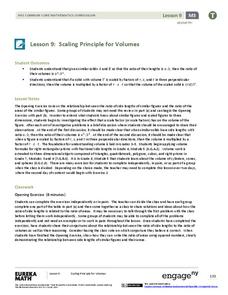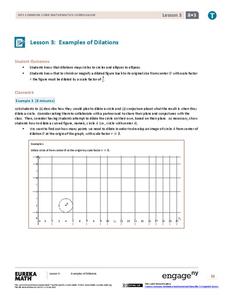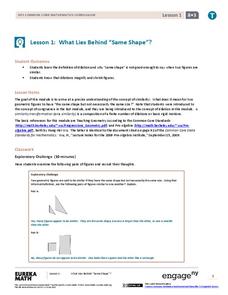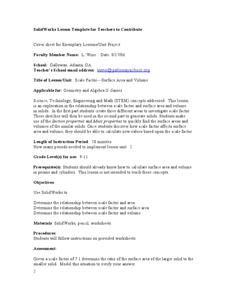Journey Through the Universe
The Voyage Scale Model Solar System
Young scientists learn how to select a scale factor for a large scale model. Then they figure the scale for each of the planets and the distance between them. Finally, they construct a giant scale model of the solar system and answer...
EngageNY
Changing Scales
Pupils determine scale factors from one figure to another and the scale factor in the reverse direction. Scholars compute the percent changes between three figures.
EngageNY
Computing Actual Lengths from a Scale Drawing
The original drawing is eight units — how big is the scale drawing? Classmates determine the scale percent between a scale drawing and an object to calculate the length of a portion of the object. They use the percent equation to find...
Curated OER
Exploring Similarity Using Scale Drawings
Learners explore scale factor as they create a scale drawing of a box, then determine the surface area and volume of the original and the scale drawing. The one page worksheet contains activities and procedures with four questions....
Curated OER
Understanding Proportions and Scale Drawings
Proportions are ratios found using multiplication or division. Middle schoolers solve measurement problems, find a figure's missing dimension, and find the distance between two points. Resource features four lesson plans with detailed...
Illustrative Mathematics
How Many Leaves on a Tree?
This is great go-to activity for those spring or fall days when the weather beckons your geometry class outside. Learners start with a small tree, devising strategies to accurately estimate the leaf count. They must then tackle the...
Curated OER
Solve for Scale Factors Using Proportions
Eighth graders solve problems using proportions with scaled drawings. They work with maps and blue-prints discussing scales and plans and examine different polygons and figure out the scale factors or proportions they have been changed by.
EngageNY
Scaling Principle for Volumes
Review the principles of scaling areas and draws a comparison to scaling volumes with a third dimensional measurement. The exercises continue with what happens to the volume if the dimensions are not multiplied by the same...
Curated OER
Finding Volume of Similar Figures
Upper elementary and middle schoolers examine the Volumes of Similar Figures. They investigate the relationship between corresponding sides and evaluate the volume of similar figures. Pupils record their findings on various activity...
EngageNY
Making Scale Drawings Using the Ratio Method
Is that drawn to scale? Capture the artistry of geometry using the ratio method to create dilations. Mathematicians use a center and ratio to create a scaled drawing. They then use a ruler and protractor to verify measurements.
Curated OER
Scale Factors for Areas and Volumes
Learners examine mathematical questions. They examine how to tackle mathematical questions and discover the effect of a change in length on area and volume. They examine the consequences of the physical properties sea animals on heat...
Curated OER
Investigating Scale Factors with the Geometer's Sketchpad
Students use Geometer's Sketchpad to examine the scale factor when in is applied to the length of a figure's sides. They look at how the scale factor affects the side lengths, perimeter, and area of the figure that result. They work with...
EngageNY
Dilations from Different Centers
Can you follow a composition of transformations, or better yet construct them? Young mathematicians analyze the composition of dilations, examining both the scale factor and centers of dilations. They discover relationships for both...
EngageNY
Examples of Dilations
Does it matter how many points to dilate? The resource presents problems of dilating curved figures. Class members find out that not only do they need to dilate several points but the points need to be distributed about the entire curve...
Curated OER
Super Size It, Please!
Pupils take photos from a given distance and determine the height of the person using a scale factor. Pupils calculate the ratio of student actual height to student photo height. They take pictures from 3 different distances to see if...
EngageNY
What Lies Behind “Same Shape”?
Develop a more precise definition of similar. The lesson begins with an informal definition of similar figures and develops the need to be more precise. The class learns about dilations and uses that knowledge to arrive at a...
EngageNY
Dilations on the Coordinate Plane
Dilations from the origin have a multiplicative effect on the coordinates of a point. Pupils use the method of finding the image of a point on a ray after a dilation to find a short cut. Classmates determine the short cut of being...
Curated OER
Measure: Bearings and Scale Drawings
Pupils practice drawing geometric figures. In this geometry lesson plan, learners complete an activity that requires them to draw angles and shapes to the nearest degree.
EngageNY
The Scaling Principle for Area
As they investigate scaling figures and calculate the resulting areas, groups determine the area of similar figures. They continue to investigate the results when the vertical and horizontal scales are not equal.
Curated OER
Scale Factor- Surface Area and Volume
Young scholars calculate the surface area and volume of shapes. For this geometry lesson, students create different scales and calculate the volume and area for each shape. They compare and contrast between the different scales and shapes.
Curated OER
Finding Area of Similar Figures
Students explore the concept of finding area of similar figures. In this finding area of similar figures lesson, students use pattern blocks to construct similar figures. Students trace their construction and find the area. Students...
EngageNY
Making Scale Drawings Using the Parallel Method
How many ways can you create a dilation? Many! Individuals strengthen their understanding of dilations by using various methods to create them. The new technique builds on pupils' understanding of the ratio method. Using the ratio,...
EngageNY
How Do Dilations Map Angles?
The key to understanding is making connections. Scholars explore angle dilations using properties of parallel lines. At completion, pupils prove that angles of a dilation preserve their original measure.
EngageNY
How Do Dilations Map Lines, Rays, and Circles?
Applying a learned technique to a new type of problem is an important skill in mathematics. The lesson asks scholars to apply their understanding to analyze dilations of different figures. They make conjectures and conclusions to...























